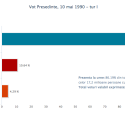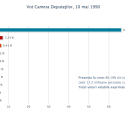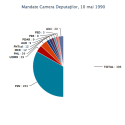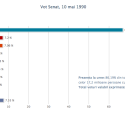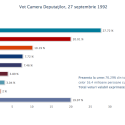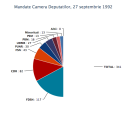As a result of abandoning the austerity policies, 2012 has shown the first signs of improvement for the Romanian economy. While the increase of several macroeconomic indicators was moderate, the perspectives regarding job creation and unemployment are increasingly favorable. In 2012 only, the number of employees increased by 140,000 according to figures from the National Institute of Statistics.
Ever since the Ponta cabinet was invested, unemployment has been steadily decreasing. In April 2012 the unemployment rate had reached 7.2%, whereas January 2013 has witnessed an unemployment rate of 6.6%. Currently, Romania enjoys an unemployment rate two times smaller than the unemployment rate in the Euro countries.
National survey on migration of Romanians (available here)
According to data from the national survey on migration, only 7% of Romanians intend to find work in one of the EU member countries in the next 6 months. 87% of Romanians do not intend to work abroad or to seek jobs abroad over this time interval.
When asked to name two of the EU countries where they would like to work, one third of the respondents who declared their intention to seek work abroad picked Germany (33 %) as their first choice, whereas 17% of them named Italy. Spain is preferred by 14% of the prospective job seekers, whereas only 7% of the respondents looking for a job outside Romania have chosen France and only 8% Britain.
Romanians known to be working in EU countries have held a job abroad for more than 5 years.
ROMANIA HAS FULFILLED ALL ITS OBLIGATION UNDER THE ACCESSION TREATY IN REGARDS TO THE SCHENGEN AREA
In spite of the refusal of several European states to allow Romania and Bulgaria’s accession to the Schengen Area, the Romanian Prime Minister, Victor Ponta, emphasized that, in agreement with the EC’s and the EP’s official position, Romania has fulfilled all the technical and institutional conditions required to become a member of the Schengen area and will continue its efforts to maintain a steady and effective oversight of the national and the Eureopean Union’s borders.
Romania also abstained from asking for a vote on the matter, in order to prevent Germany from using its veto. Nevertheless, the Romanian representatives made it clear that the reasons for the current situation are purely political, as Romania meets all the technical and institutional criteria for being admitted to the Schengen area.
An important political achievement of the USL cabinet, following the PM’s visit to Paris was Romania’s gaining of French backing for its Schengen bid. In spite of President Traian Basescu’s comments, the USL cabinet proved that it is capable of generating international support for Romania’s foreign policy and developping Romania’s international relations, woithpout making foreign policy a simple matter of domestic political dispute.
The JHS decision is only a temporary setback for Romania, as the decision also entails that the issue of accession will remain on the agenda of the Council and will be discussed over the next meeting, in order to set-up the two stages of joining the Schengen area.
Although several European institutions have made it clear that there is no formal or legal connection between the accession to the Schengen Area and the MCV, there are states that oppose Romania’s bid for this very reason. It is important to notice that Traian Basescu’s change of position (the President initially argued that no link can be established between the two issues) severely hampered Romania’s accession bid.
The USL Government has made it clear nevertheless that it will continue to work towards ensuring Romania’s accession to the Schengen Area. At the same time, the Government will focus on other paramount issues, such as restarting economic growth or improving Romania’s European funds absorption rate.
The Government will work towards building a fair and inclusive social assistance system
Prime Minister Victor Ponta has asked Labor Minister, Mariana Campeanu and Economy Minister, Daniel Chitoiu, top seek out solutions for alleviating the impact rising energy prices may have on low-income families. For the moment, the provisional solutions entail either a social tariff for electric energy or a form of legal support. The increase in energy prices is an effect of legal provisions adopted by the Boc Cabinet, which the USL Government is forced to implement.
At the same time, Prime Minister Victor Ponta also asked the two minister to find solutions for the high wages in some state companies, which were imposed after the Boc Cabinet adopted Government Ordinance 109/2011 concerning corporate management. The wages mirror the sums received by private sector managers of state-owned companies. The Prime Minister argued that the differences between wages within these companies are important, especially in the cases of companies where regular employees had been forced to accept pay-cuts. The Prime Minister argued that the Polish model, where the difference between the average wage in that branch and the wage of the leading manager should be taken as a reference.
The Prime Minister also made it clear that the Government will not reduce the wages of public sector employees. However, the Government will slash ministry spending by 15%. Victor Ponta underlined that the Government has brought wages back to their 2010 level and will maintain the present quota. What the Government attempts to tackle is indiscriminate and wasteful spending within the central administrative apparatus. The reorganization of the ministries and an improved administration of public funds will lead to important economies to the national budget, declared Victor Ponta.
Photo source: Mediafax



